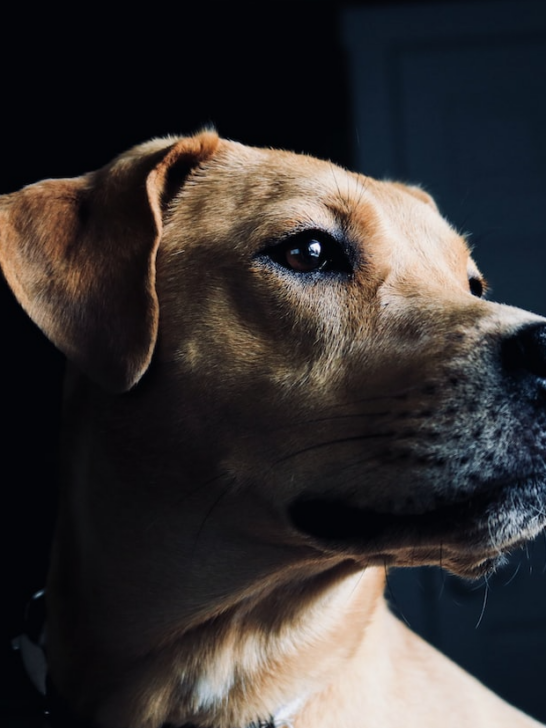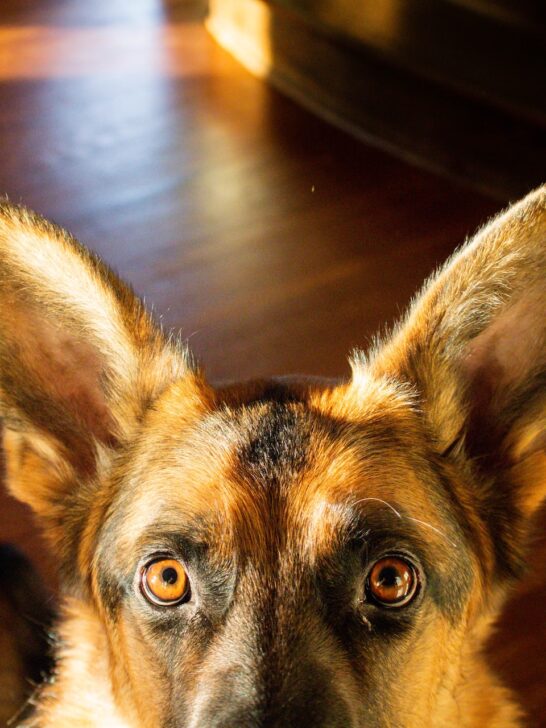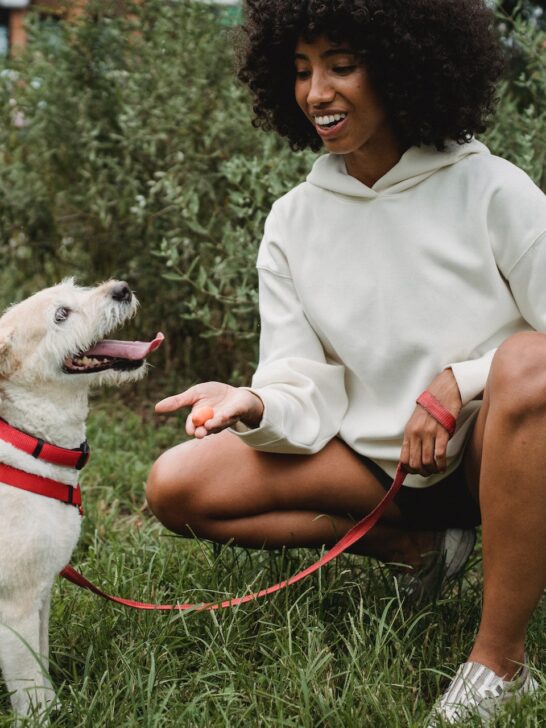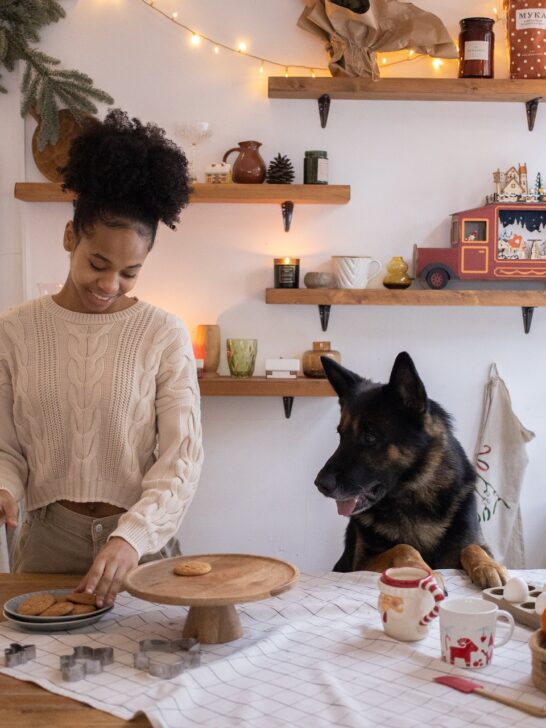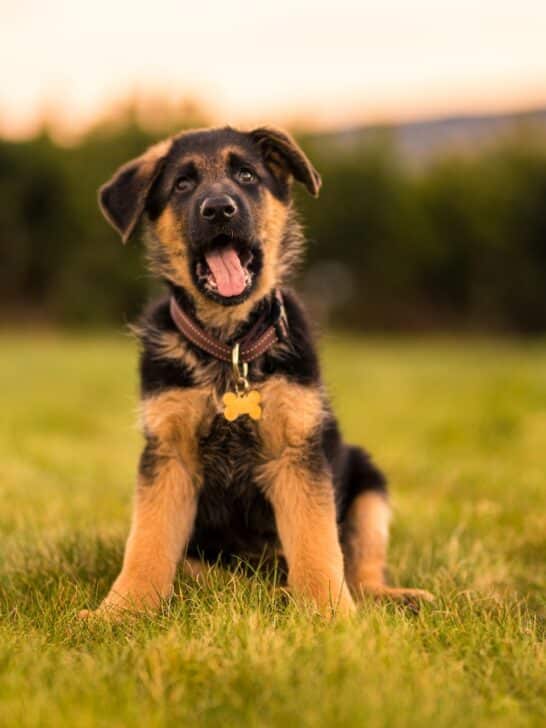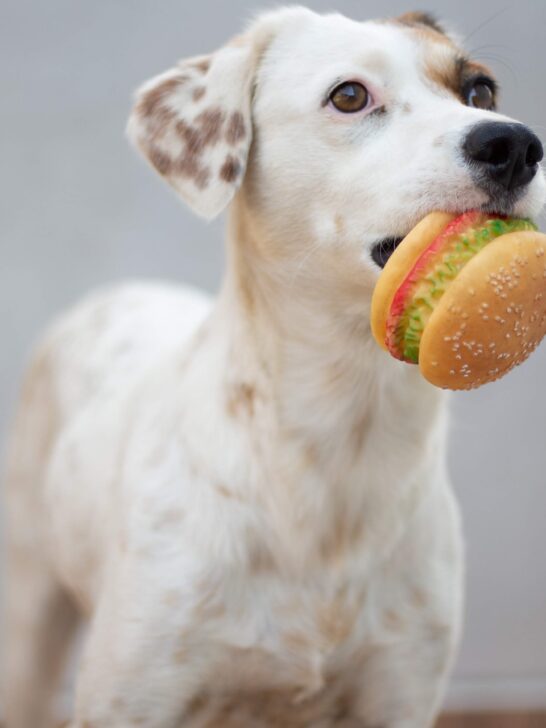How to Take Care of a 1-Month-Old German Shepherd Puppy
1-month-old German Shepherd puppies are absolutely adorable, aren’t they?
Still, as babies, it’s your responsibility as an owner to take good care of them and ensure they grow up to become happy and healthy dogs.
The following article will tackle key issues about caring for a one-month-old German Shepherd puppy, from preparing the pup home, common early age issues, potty training, feeding, and more. Let’s get started!
Preparing Your House and Yard For a German Shepherd Puppy
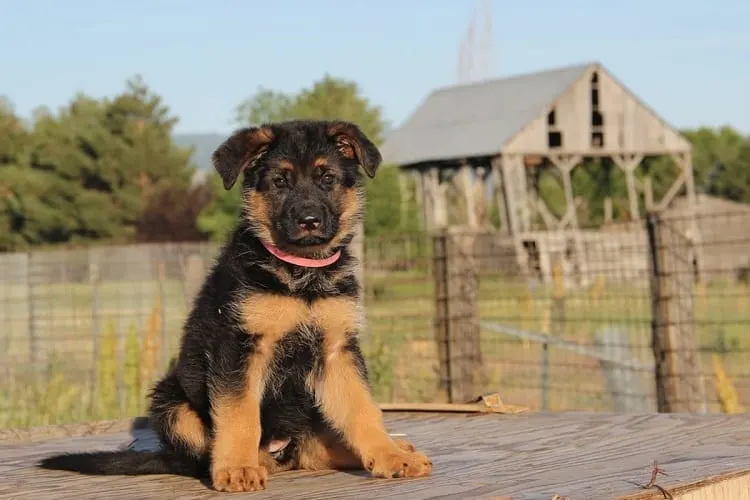
Your month-old German Shepherd puppy will soon grow into a large dog. And large dogs need to have many care factors taken care of to thrive.
So, the first step is preparing for a home suitable for a German Shepherd puppy that will one day become a big dog.
First, make sure you have enough space for them to run and play. If you have a small yard, consider getting a dog run or fence to give them extra room as well as space for you to do important obedience training exercises.
You’ll also need to puppy-proof your home by putting away anything that could be harmful or dangerous GSD puppy, such as cleaning supplies and medications.
And finally, be sure to stock up on puppy food, treats, toys, and other essentials. With some preparation, you’ll be ready to welcome your new German Shepherd into the family.
Separation Anxiety
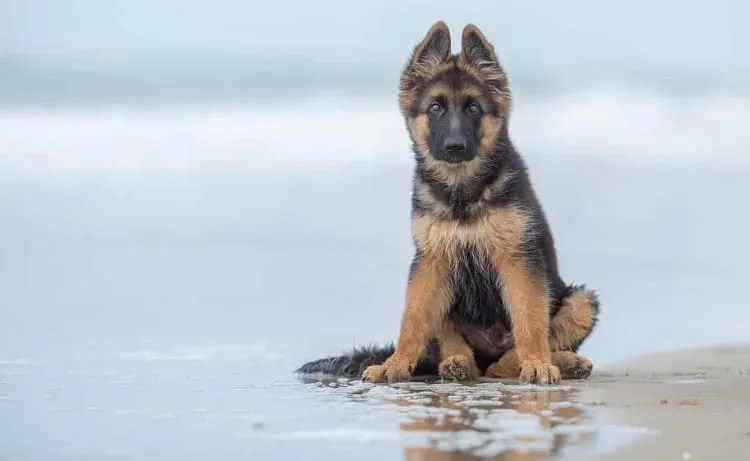
It is common for month-old German Shepherd puppies to develop separation anxiety when they are first separated from their parents and litter mates.
It is because they have not yet learned how to cope with being away from their pack, especially in the first few weeks.
Separation anxiety can manifest in several ways, including howling, barking, chewing, and pacing. If your German Shepherd shows separation anxiety, seek professional help from a vet or an animal behaviorist.
With the help of these experts, you can learn how to ease your German Shepherd’s stress and help them adjust to being away from their pack.
Remember, separation anxiety is a normal and natural part of the development of a month-old German Shepherd puppy, so don’t be discouraged.
With time, patience, and guidance, your German Shepherd puppy will learn to cope with being away from other dogs and, little by little, start getting used to you (and your family).
Potty Training for 1-Month-Old German Shepherd Puppy
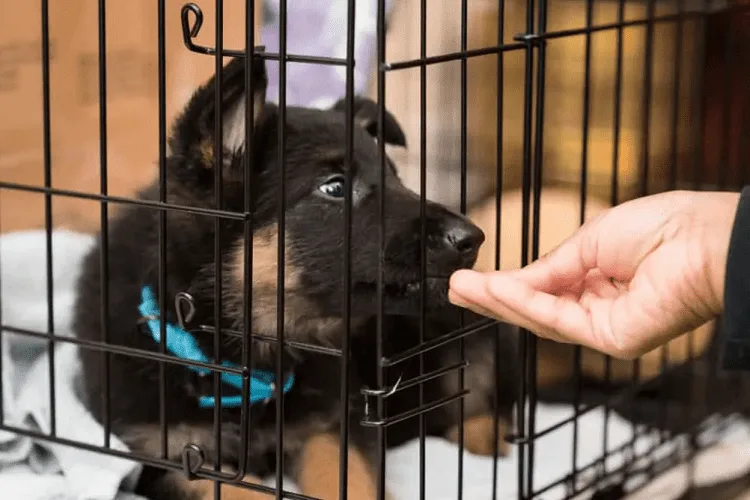
Potty training can be one of the most challenging parts of caring for a month-old German Shepherd puppy. But don’t worry, we’re here to help!
First, it is crucial to understand that basic training for your German Shepherd to potty is a process and will take time, patience, and consistency.
No magic solution will instantly train your month-old German Shepherd puppy to use the bathroom outside.
Instead, it requires positive reinforcement, consistent follow-through, and a lot of patience. Let’s go through some tips.
A Month-Old German Shepherd Puppy Schedule
The first step is establishing a regular potty schedule for your German Shepherd puppy. It means taking your puppy out to relieve themselves regularly throughout the day.
Your one-month-old German Shepherd puppy should have a potty training schedule first thing in the morning, after every meal, after naps and playtime, and before bedtime.
If you stick to this schedule, you will succeed. German Shepherd puppies generally have to relieve themselves every two to three hours, so be sure to set a timer or alarm to remind yourself to take them out.
Introducing a Puppy Crate
Choose a designated potty area, a.k.a “a puppy crate.” It should be an area that is easily accessible, such as a backyard or dog run.
You can use a puppy crate if you don’t have a fenced-in area. A puppy crate is a small, enclosed space that will serve as your puppy’s “den.”
It should be large enough for your German Shepherd to stand up, turn around, and lie down but small enough that he won’t want to use the bathroom.
You can find puppy crates for your German Shepherd puppy at most pet stores or online retailers.
Once you’ve chosen a potty area, it’s time to introduce your German Shepherd puppy to its new space. Start by taking them to the designated area on a leash and letting them explore.
It’s essential to ensure that your German Shepherd puppy feels comfortable and safe in their designated potty area before moving on to the next step.
Give it a treat if it shows interest in the space. Try again later if the puppy shows no interest or seems scared of the room.
Potty Training Tips and Tricks
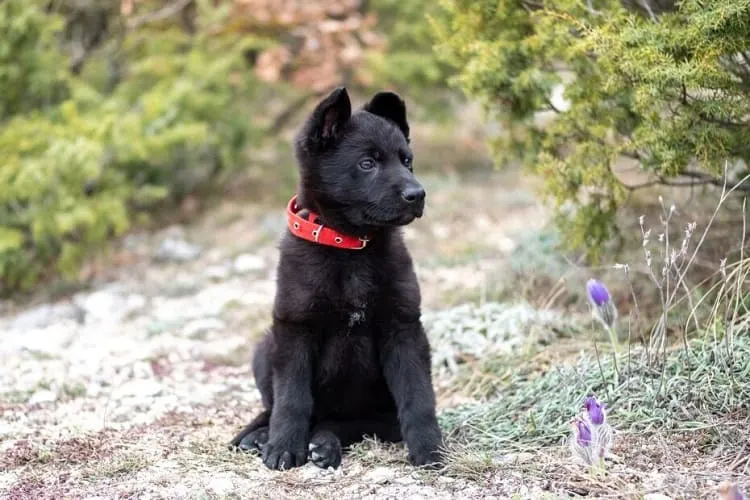
Now that you’ve chosen a designated potty area and introduced your German Shepherd puppy to its new space, it’s time to start the German Shepherd puppy training to use the bathroom outside.
Here are a few tips and tricks to help you get started:
- Use a leash: When taking your German Shepherd out to relieve themselves, use a leash to keep them focused and prevent them from running off and exploring.
- Fixed routine: Try to take your German Shepherd to his designated potty area at the same time each day. It will help him develop a regular bathroom schedule.
- Give them time: When you get to the designated potty area, give your German Shepherd puppy plenty of time to relieve themselves. If your German Shepherd doesn’t go within a few minutes, bring them back inside and try again in an hour.
- Reward good behavior: When your German Shepherd uses the bathroom in their designated potty area, praise them and give them a tasty treat. It will reinforce correct behavior and help your German Shepherd puppy learn that going potty outside is good.
- Avoid punishment: It is essential to avoid punishing your German Shepherd if there’s an accident inside. It will only scare your German Shepherd puppy and could cause it to hold urine or feces in, leading to health problems.
Food Requirements for a 1-Month-Old German Shepherd
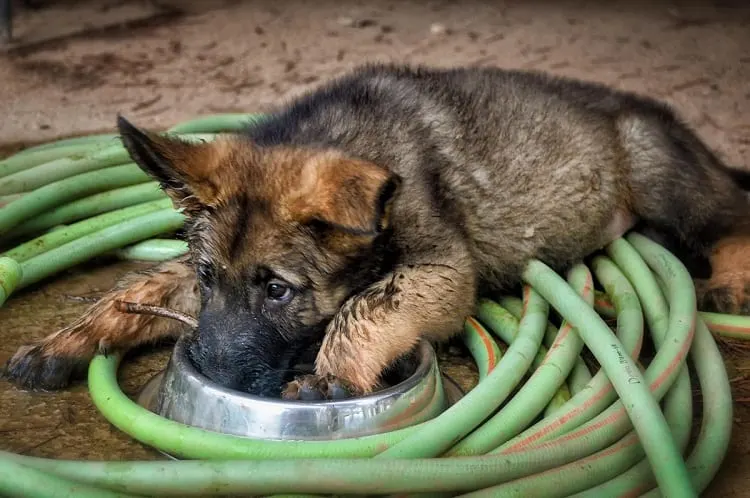
German Shepherds are a high-energy breed, requiring a lot of calories. The best diet consists of at least 1200-2400 calories, depending on the German Shepherd’s weight chart.
German Shepherd puppies that are weaning for a few weeks to 12 years require four meals daily.
After 12 weeks, you can switch to 3 meals per day. Your German Shepherd should maintain a diet of 2-3 cups of puppy food per day, depending on their activity level.
The German Shepherd breed is also prone to joint problems, so ensure they get the proper nutrients for healthy joints and bones.
A quality dog food for your German Shepherd will have the right balance of calcium, phosphorus, and other nutrients like glucosamine and chondroitin.
German Shepherd Puppy Health Issues
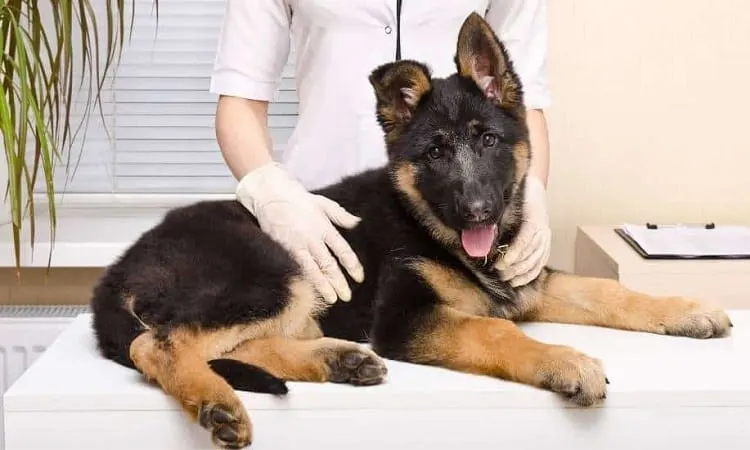
A German Shepherd is susceptible to breed-specific health issues like any other dog breed. The most common health issues seen in the German Shepherd dog breed are the following.
Hip or Elbow Dysplasia
These two are common joint problems for German Shepherds. These conditions are caused by a hip or elbow joint malformation, leading to pain, lameness, and eventually arthritis.
German Shepherds with these conditions will require lifelong pain medication and surgery management.
Bloating
Bloating is another common health problem seen in German Shepherds. This condition occurs when the stomach fills with gas and then twists on itself, cutting off the blood supply.
Bloating can be deadly to the German Shepherd breed if not treated immediately, so it’s essential to know the signs.
Some of the most common signs of bloating include restlessness, pacing, drooling, and abdominal pain. Contact your vet immediately if you think your German Shepherd is bloated.
Hemophilia
Hemophilia is a blood clotting disorder that can affect German Shepherds. This condition can lead to excessive bleeding, even from minor injuries.
German Shepherds with hemophilia will require lifelong management with medication and close monitoring by a vet.
The best way to prevent health problems in your German Shepherd breed is to get them from reputable breeders who do health testing on their dogs.
Be sure to ask about the health history of the parents, grandparents, and brothers or sisters.
Having your German Shepherd examined by a vet within the first few days of bringing them home is also essential. It will allow you to catch any health problems early and get treatment immediately.
Degenerative Disc Disease
Degenerative disc disease is a condition that can occur in German Shepherds. This condition is caused by the deterioration of the discs in the spine.
It can lead to pain and paralysis. German Shepherds with this condition will require lifelong management with pain medication and surgery.
Allergies
German Shepherds are also susceptible to allergies, which can be caused by anything from food to environmental allergens.
The most common signs of an allergic reaction include itching, redness, and hair loss.
If you think your German Shepherd has allergies, it is vital to speak to your vet so they can recommend the best course of treatment.
While there is no guarantee that your German Shepherd will never experience any health problems, working with a reputable breeder and taking good care of your German Shepherd will help to minimize the risk.
How Long Does a One-Month-Old German Shepherd Sleep?
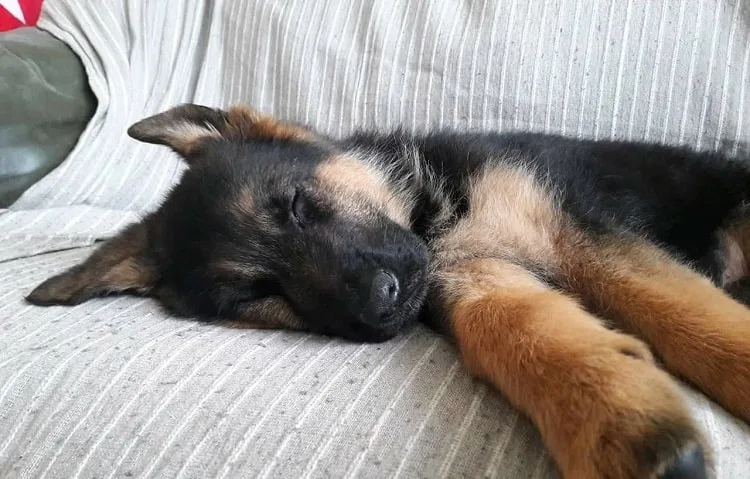
Don’t worry if your 8-week-old German Shepherd puppy seems to sleep all the time. It’s perfectly normal for puppies to sleep a lot – up to 18 hours a day. It is essential for their growth.
Of course, this doesn’t mean that your German Shepherd will just be sleeping through the night. German Shepherd puppies usually wake up several times during the night for a potty break or a quick snack.
Over time, your German Shepherd will learn to sleep through the night as they grow and mature. In the meantime, enjoy those cute German Shepherd puppy naps.
Also read:
- How to Take Care of a 4-Month-Old German Shepherd
- How to Take Care of a 3-Month-Old German Shepherd
- 8-Week-Old German Shepherd – Routine And Care
Conclusion
German Shepherds are the perfect breed for active people. They require a lot of guidance, exercise, and training, but the payoff is having a loyal and loving companion.
A German shepherd puppy is, undoubtedly, quite the challenge. However, with proper care, dedication, and patience, it will grow into a beautiful, happy, and healthy life companion.
Enjoy their baby months and don’t forget to take lots of pictures!
We hope this article helped you!
Resources:
























